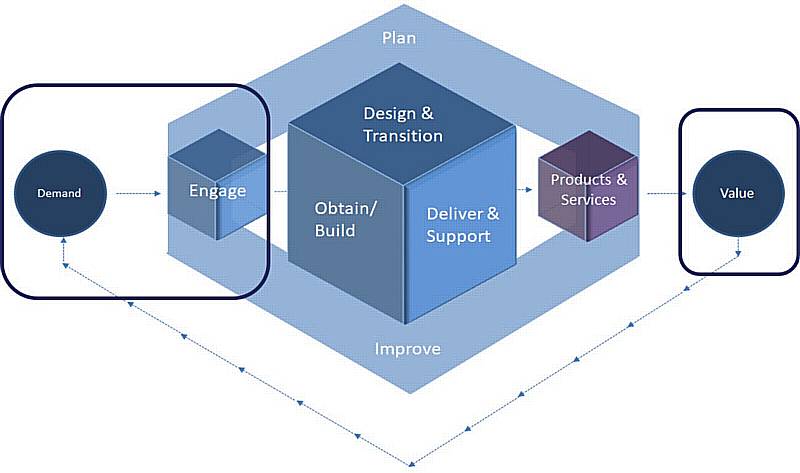ITIL 4 Specialist - Drive Stakeholder Value plus Exam
To drive stakeholder value, all stakeholders must contribute to the co-creation of service value. The Drive Stakeholder Value 3-day course aims to guide stakeholders, whether they are customers or service providers, through the principles and practices of co-creating value through services.
Description
This course will discuss the main steps of a customer journey, providing guidance on how to co-create the most valuable journey. The course, therefore, focuses on activities related to accepting Demand, Engaging with Stakeholders, and realizing Value.

Overview
The purpose of the ITIL 4 Drive Stakeholder Value Qualification is:
- to provide the candidate with an understanding of all types of engagement and interactions between a service provider and their customers, users, suppliers and partners, including key CX, UX and journey mapping concepts.
The purpose of the ITIL 4 Drive Stakeholder Value Examination is:
- to assess whether the candidate can demonstrate sufficient understanding and application of ITIL 4 to all types of engagement and interaction between a service provider and their customers, users, suppliers and partners. The ITIL 4 Drive Stakeholder Value qualification is one of the pre-requisites for the designation of ITIL 4 Managing Professional which assesses the candidates practical and technical knowledge about how to run successful, modern, IT-enabled services, teams and workflows.
The target audience for this qualification is:
- individuals continuing their journey in service management
- ITSM managers and aspiring ITSM managers
- ITSM practitioners who are responsible for managing and integrating stakeholders, focus on the customer journey and experience, and/or are responsible for fostering relationships with partners and suppliers
- existing ITIL qualification holders wishing to develop their knowledge.
Content
Understand how customer journeys are designed
- Understand the concept of the customer journey
- Understand the ways of designing and improving customer journeys
Know how to target markets and stakeholders
- Understand the characteristics of markets
- Understand marketing activities and techniques
- Know how to describe customer needs and internal and external factors that affect these
- Know how to identify service providers and explain their value propositions
Know how to foster stakeholder relationships
- Understand the concepts mutual readiness and maturity
- Understand the different supplier and partner relationship types, and how these are managed
- Know how to develop customer relationships
- Know how to analyse customer needs
- Know how to use communication and collaboration activities and techniques
- Know how the “Relationship management” practice can be applied to enable and contribute to fostering relationships
- Know how the “Supplier management” practice can be applied to enable and contribute to supplier and partner relationships management
Know how to shape demand and define service offerings
- Understand methods for designing digital service experiences based on value driven, data driven and user centred service design
- Understand approaches for selling and obtaining service offerings
- Know how to capture, influence and manage demand and opportunities
- Know how to collect, specify and prioritise requirements from a diverse range of stakeholders
- Know how the “Business analysis” practice can be applied to enable and contribute to requirement management and service design
Know how to align expectations and agree details of services
- Know how to plan for value co-creation
- Know how to negotiate and agree service utility, warranty and experience
- Know how the “Service level management” practice can be applied to enable and contribute to service expectation management
Know how to onboard and offboard customers and users
- Understand key transition, onboarding and offboarding activities
- Understand the ways of relating with users and fostering user relationships
- Understand how users are authorized and entitled to services
- Understand different approaches to mutual elevation of customer, user and service provider capabilities
- Know how to prepare onboarding and offboarding plans
- Know how to develop user engagement and delivery channels
- Know how the “Service Catalogue management” practice can be applied to enable and contribute to offering user services
- Know how the “Service Desk” practice can be applied to enable and contribute to user engagement
Know how to act together to ensure continual value co-creation (service consumption / provisioning)
- Understand how users can request services
- Understand methods for triaging of user requests
- Understand the concept of user communities
- Understand methods for encouraging and managing customer and user feedback
- Know how to foster a service mindset (attitude, behaviour and culture)
- Know how to use different approaches to provision of user services
- Know how to seize and deal with customer and user ‘moments of truth’
- Know how the “Service request management” practice can be applied to enable and contribute to service usage
Know how to realise and validate service value
- Understand methods for measuring service usage and customer and user experience and satisfaction
- Understand different types of reporting of service outcome and performance
- Understand charging mechanisms
- Know how to assess service value realization
- Know how to prepare to evaluate and improve the customer journey
- Know how the “Portfolio management” practice can be applied to enable and contribute to service value realisation
Exam
- 90 minutes closed book exam
- 40 multiple choice questions (each one being worth 1 mark)
- Pass mark 28 out of 40 or 70%.
Prerequisites
Candidates must have passed the ITIL4 Foundation examination to attend this course.